首先谈谈初中作文与高中作文的区别 [1500字]
论初中英语写作与高中英语写作教学的异同
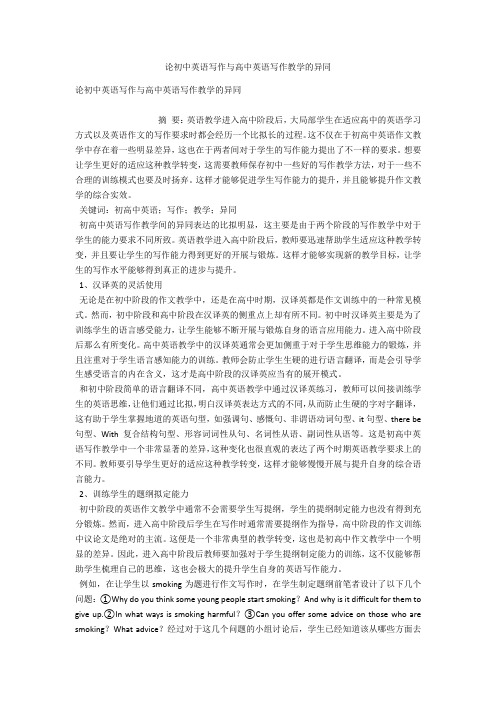
论初中英语写作与高中英语写作教学的异同论初中英语写作与高中英语写作教学的异同摘要:英语教学进入高中阶段后,大局部学生在适应高中的英语学习方式以及英语作文的写作要求时都会经历一个比拟长的过程。
这不仅在于初高中英语作文教学中存在着一些明显差异,这也在于两者间对于学生的写作能力提出了不一样的要求。
想要让学生更好的适应这种教学转变,这需要教师保存初中一些好的写作教学方法,对于一些不合理的训练模式也要及时扬弃。
这样才能够促进学生写作能力的提升,并且能够提升作文教学的综合实效。
关键词:初高中英语;写作;教学;异同初高中英语写作教学间的异同表达的比拟明显,这主要是由于两个阶段的写作教学中对于学生的能力要求不同所致。
英语教学进入高中阶段后,教师要迅速帮助学生适应这种教学转变,并且要让学生的写作能力得到更好的开展与锻炼。
这样才能够实现新的教学目标,让学生的写作水平能够得到真正的进步与提升。
1、汉译英的灵活使用无论是在初中阶段的作文教学中,还是在高中时期,汉译英都是作文训练中的一种常见模式。
然而,初中阶段和高中阶段在汉译英的侧重点上却有所不同。
初中时汉译英主要是为了训练学生的语言感受能力,让学生能够不断开展与锻炼自身的语言应用能力。
进入高中阶段后那么有所变化。
高中英语教学中的汉译英通常会更加侧重于对于学生思维能力的锻炼,并且注重对于学生语言感知能力的训练。
教师会防止学生生硬的进行语言翻译,而是会引导学生感受语言的内在含义,这才是高中阶段的汉译英应当有的展开模式。
和初中阶段简单的语言翻译不同,高中英语教学中通过汉译英练习,教师可以间接训练学生的英语思维,让他们通过比拟,明白汉译英表达方式的不同,从而防止生硬的字对字翻译,这有助于学生掌握地道的英语句型,如强调句、感慨句、非谓语动词句型、it句型、there be 句型、With复合结构句型、形容词词性从句、名词性从语、副词性从语等。
这是初高中英语写作教学中一个非常显著的差异,这种变化也很直观的表达了两个时期英语教学要求上的不同。
初中语文和高中语文有何不同作文
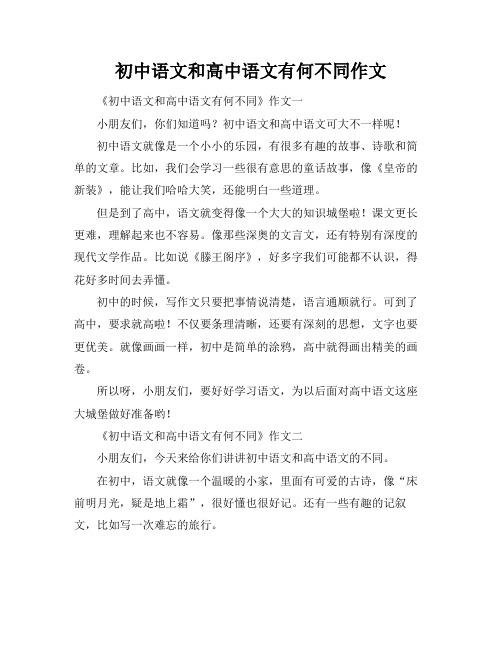
初中语文和高中语文有何不同作文《初中语文和高中语文有何不同》作文一
小朋友们,你们知道吗?初中语文和高中语文可大不一样呢!
初中语文就像是一个小小的乐园,有很多有趣的故事、诗歌和简单的文章。
比如,我们会学习一些很有意思的童话故事,像《皇帝的新装》,能让我们哈哈大笑,还能明白一些道理。
但是到了高中,语文就变得像一个大大的知识城堡啦!课文更长更难,理解起来也不容易。
像那些深奥的文言文,还有特别有深度的现代文学作品。
比如说《滕王阁序》,好多字我们可能都不认识,得花好多时间去弄懂。
初中的时候,写作文只要把事情说清楚,语言通顺就行。
可到了高中,要求就高啦!不仅要条理清晰,还要有深刻的思想,文字也要更优美。
就像画画一样,初中是简单的涂鸦,高中就得画出精美的画卷。
所以呀,小朋友们,要好好学习语文,为以后面对高中语文这座大城堡做好准备哟!
《初中语文和高中语文有何不同》作文二
小朋友们,今天来给你们讲讲初中语文和高中语文的不同。
在初中,语文就像一个温暖的小家,里面有可爱的古诗,像“床前明月光,疑是地上霜”,很好懂也很好记。
还有一些有趣的记叙文,比如写一次难忘的旅行。
可高中的语文呢,就像一个大大的博物馆。
有超级难的古代文学,像《离骚》,读起来可费劲啦。
而且阅读的文章也更复杂,需要我们开动小脑袋认真思考。
初中写作文,可能像给好朋友讲个小故事。
但高中写作文,就像是要给很多很多人做一场精彩的演讲,要有厉害的观点和漂亮的词句。
初中语文是轻松有趣的,高中语文是更有挑战的。
小朋友们,要加油哦,以后才能学好高中语文!。
高中作文与初中作文的区别
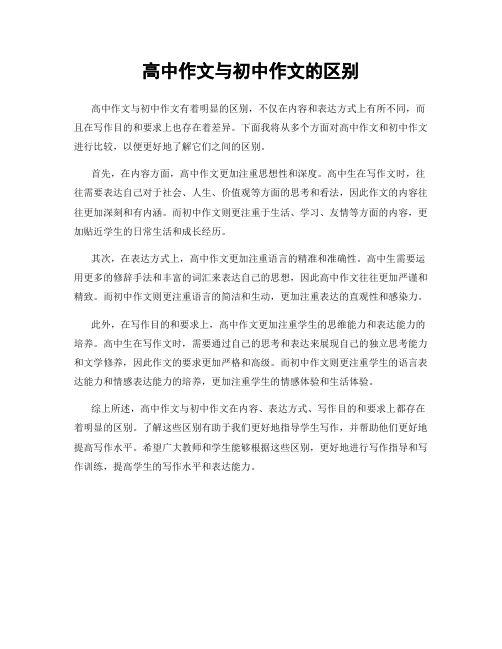
高中作文与初中作文的区别
高中作文与初中作文有着明显的区别,不仅在内容和表达方式上有所不同,而且在写作目的和要求上也存在着差异。
下面我将从多个方面对高中作文和初中作文进行比较,以便更好地了解它们之间的区别。
首先,在内容方面,高中作文更加注重思想性和深度。
高中生在写作文时,往往需要表达自己对于社会、人生、价值观等方面的思考和看法,因此作文的内容往往更加深刻和有内涵。
而初中作文则更注重于生活、学习、友情等方面的内容,更加贴近学生的日常生活和成长经历。
其次,在表达方式上,高中作文更加注重语言的精准和准确性。
高中生需要运用更多的修辞手法和丰富的词汇来表达自己的思想,因此高中作文往往更加严谨和精致。
而初中作文则更注重语言的简洁和生动,更加注重表达的直观性和感染力。
此外,在写作目的和要求上,高中作文更加注重学生的思维能力和表达能力的培养。
高中生在写作文时,需要通过自己的思考和表达来展现自己的独立思考能力和文学修养,因此作文的要求更加严格和高级。
而初中作文则更注重学生的语言表达能力和情感表达能力的培养,更加注重学生的情感体验和生活体验。
综上所述,高中作文与初中作文在内容、表达方式、写作目的和要求上都存在着明显的区别。
了解这些区别有助于我们更好地指导学生写作,并帮助他们更好地提高写作水平。
希望广大教师和学生能够根据这些区别,更好地进行写作指导和写作训练,提高学生的写作水平和表达能力。
首先谈谈初中作文与高中作文的区别
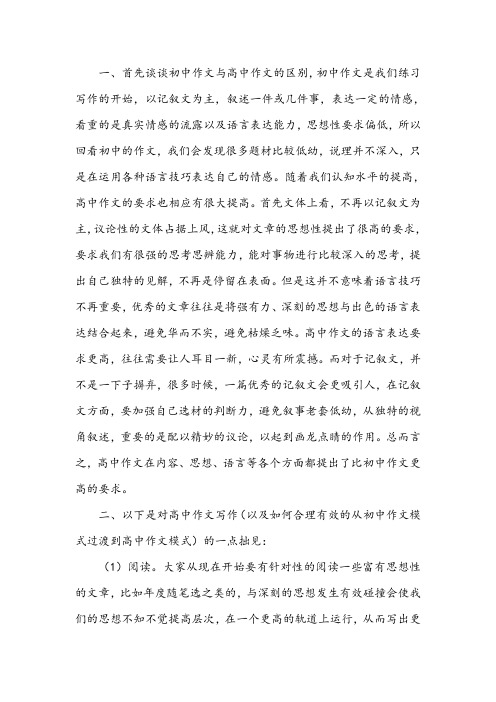
一、首先谈谈初中作文与高中作文的区别,初中作文是我们练习写作的开始,以记叙文为主,叙述一件或几件事,表达一定的情感,看重的是真实情感的流露以及语言表达能力,思想性要求偏低,所以回看初中的作文,我们会发现很多题材比较低幼,说理并不深入,只是在运用各种语言技巧表达自己的情感。
随着我们认知水平的提高,高中作文的要求也相应有很大提高。
首先文体上看,不再以记叙文为主,议论性的文体占据上风,这就对文章的思想性提出了很高的要求,要求我们有很强的思考思辨能力,能对事物进行比较深入的思考,提出自己独特的见解,不再是停留在表面。
但是这并不意味着语言技巧不再重要,优秀的文章往往是将强有力、深刻的思想与出色的语言表达结合起来,避免华而不实,避免枯燥乏味。
高中作文的语言表达要求更高,往往需要让人耳目一新,心灵有所震撼。
而对于记叙文,并不是一下子摒弃,很多时候,一篇优秀的记叙文会更吸引人,在记叙文方面,要加强自己选材的判断力,避免叙事老套低幼,从独特的视角叙述,重要的是配以精妙的议论,以起到画龙点睛的作用。
总而言之,高中作文在内容、思想、语言等各个方面都提出了比初中作文更高的要求。
二、以下是对高中作文写作(以及如何合理有效的从初中作文模式过渡到高中作文模式)的一点拙见:(1)阅读。
大家从现在开始要有针对性的阅读一些富有思想性的文章,比如年度随笔选之类的,与深刻的思想发生有效碰撞会使我们的思想不知不觉提高层次,在一个更高的轨道上运行,从而写出更有深度的文章。
(2)观察生活,深入思考。
一切写作都是生活的子集,只有源于真实生活的文字才有感染力,引起读者的共鸣。
所以大家要用心留意生活,生活中绝佳的写作素材无处不在,从日常生活的琐屑中经过思考发掘出某些深刻有力的东西往往是作文中的亮点,作文中的一个细致入微的生活小画面,一点精辟的生活小哲理,都能为文章增色不少。
这就是小生活的巨大力量。
(3)不断借鉴。
走过高三,发现最宝贵的是印发的优秀作文,从中可以发掘很多宝贵的写作灵感。
高二作文之作文高中和初中的区别
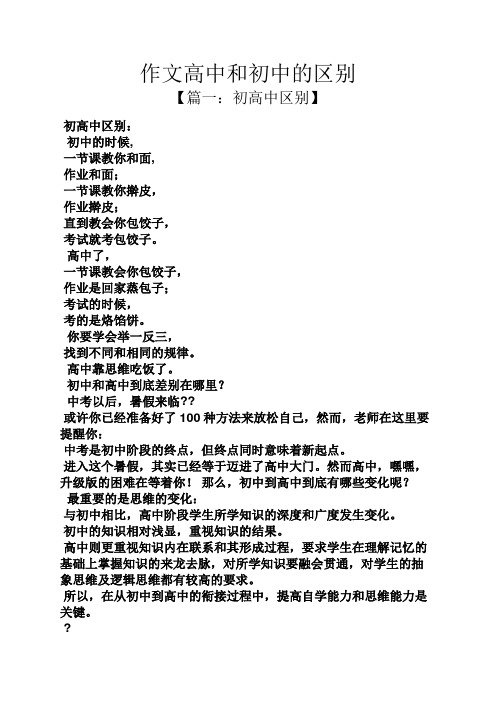
作文高中和初中的区别【篇一:初高中区别】初高中区别:初中的时候,一节课教你和面,作业和面;一节课教你擀皮,作业擀皮;直到教会你包饺子,考试就考包饺子。
高中了,一节课教会你包饺子,作业是回家蒸包子;考试的时候,考的是烙馅饼。
你要学会举一反三,找到不同和相同的规律。
高中靠思维吃饭了。
初中和高中到底差别在哪里?中考以后,暑假来临??或许你已经准备好了100种方法来放松自己,然而,老师在这里要提醒你:中考是初中阶段的终点,但终点同时意味着新起点。
进入这个暑假,其实已经等于迈进了高中大门。
然而高中,嘿嘿,升级版的困难在等着你!那么,初中到高中到底有哪些变化呢?最重要的是思维的变化:与初中相比,高中阶段学生所学知识的深度和广度发生变化。
初中的知识相对浅显,重视知识的结果。
高中则更重视知识内在联系和其形成过程,要求学生在理解记忆的基础上掌握知识的来龙去脉,对所学知识要融会贯通,对学生的抽象思维及逻辑思维都有较高的要求。
所以,在从初中到高中的衔接过程中,提高自学能力和思维能力是关键。
?从各科上来看:▲ 数学:抽象、理性、更复杂,要扔掉模式补好基础高中数学内容抽象性、理论性更强,尤其是在高一代数中,首先碰到的就是理论性很强的函数,使一些初中数学很好的学生难以适应。
高中数学的思维方法向理性层次跃进,初中数学要简单些,按一定步骤就可解决,而高中数学的解题更复杂,要求学生多角度多方面思考。
知识内容有所增加,学生在同样时间内掌握知识的工作量要明显增多。
▲ 语文:量大、面广、有深度,生活处处有语文选文上的区别:选入语文教材的作品在广度和深度上有很大区别。
初中语文的选文较简短,到高中不仅长度加长,深度也明显增加,有时甚至要从哲学、人生的角度来解读,因此不能再以初中的标准来要求自己,须在个性化体验、感悟和审美上加强,因为高中生接近成年,应具备这种能力和修养。
文言文的区别:初中的文言文大多为浅显的、有哲理性、有情节的小故事、寓言、短诗、散文,而高中的文言文则是长篇人物传记和论述文章等,需要有较强的阅读和翻译能力。
初高中语文写作区别
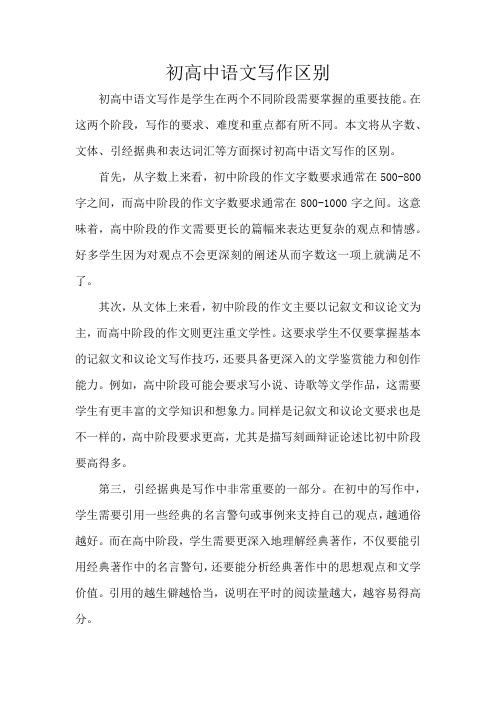
初高中语文写作区别初高中语文写作是学生在两个不同阶段需要掌握的重要技能。
在这两个阶段,写作的要求、难度和重点都有所不同。
本文将从字数、文体、引经据典和表达词汇等方面探讨初高中语文写作的区别。
首先,从字数上来看,初中阶段的作文字数要求通常在500-800字之间,而高中阶段的作文字数要求通常在800-1000字之间。
这意味着,高中阶段的作文需要更长的篇幅来表达更复杂的观点和情感。
好多学生因为对观点不会更深刻的阐述从而字数这一项上就满足不了。
其次,从文体上来看,初中阶段的作文主要以记叙文和议论文为主,而高中阶段的作文则更注重文学性。
这要求学生不仅要掌握基本的记叙文和议论文写作技巧,还要具备更深入的文学鉴赏能力和创作能力。
例如,高中阶段可能会要求写小说、诗歌等文学作品,这需要学生有更丰富的文学知识和想象力。
同样是记叙文和议论文要求也是不一样的,高中阶段要求更高,尤其是描写刻画辩证论述比初中阶段要高得多。
第三,引经据典是写作中非常重要的一部分。
在初中的写作中,学生需要引用一些经典的名言警句或事例来支持自己的观点,越通俗越好。
而在高中阶段,学生需要更深入地理解经典著作,不仅要能引用经典著作中的名言警句,还要能分析经典著作中的思想观点和文学价值。
引用的越生僻越恰当,说明在平时的阅读量越大,越容易得高分。
最后,从表达词汇上来看,初中阶段的写作要求相对较低,学生只需用简单的词汇和语法表达清楚自己的意思即可。
而高中阶段的写作则要求学生掌握更多的高级词汇和复杂的语法结构,以增强文章的表现力和深度。
比如大量的排比句可以强烈的表达自己的思想感情,复杂的长句可以更好的刻画人物内心等等。
总之,初高中语文写作在字数、文体、引经据典和表达词汇等方面都有显著的区别。
为了提高学生的写作水平,教师和学生都需要明确这些区别,并有针对性地进行训练,从而提高自己的写作水平。
初高中英语写作的区别

初高中英语写作的区别
初高中英语写作的区别主要体现在以下几个方面:
1. 字数要求不同。
初高中英语写作的字数要求不同,初中英语一般要求在100-200字左右,而高中英语则要求在200-300字左右。
2. 写作目的不同。
初高中英语写作的目的不同,初中英语主要是为了考察学生的英语基本表达能力和语言运用能力,而高中英语则更注重考察学生的英语综合能力和语言表达水平。
3. 写作内容不同。
初高中英语写作的内容也有所不同,初中英语写作一般要求学生写一些简单的描述、说明、议论等文章,而高中英语写作则要求学生写一些更复杂、更深入的文章,如论文、报告、评论等。
4. 写作技巧不同。
初高中英语写作的技巧也有所不同,初中英语写作注重语言的准确性、流畅性和简洁性,而高中英语写作则更注重文章的逻辑性、条理性和深度,需要学生掌握更多的写作技巧和方法。
总之,初高中英语写作的区别主要体现在字数要求、写作目的、写作内容和写作技巧等方面,需要学生根据不同的要求和目的,灵活运用所学的英语知识和技能,提高自己的写作水平。
高中生作文与初中作文的不同之处.
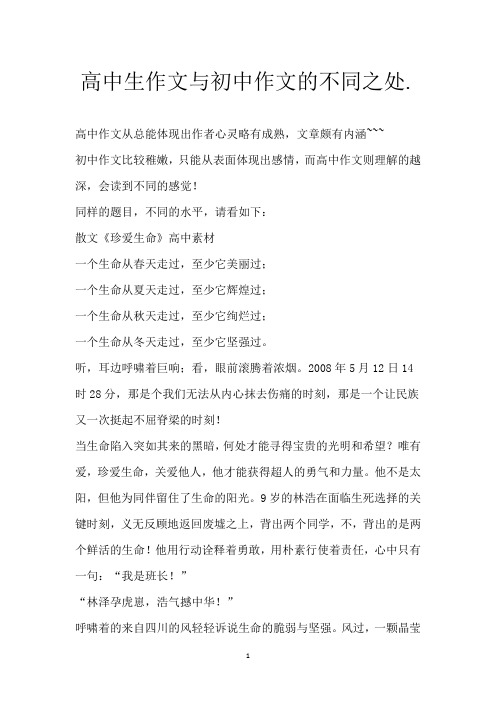
高中生作文与初中作文的不同之处.高中作文从总能体现出作者心灵略有成熟,文章颇有内涵~~~初中作文比较稚嫩,只能从表面体现出感情,而高中作文则理解的越深,会读到不同的感觉!同样的题目,不同的水平,请看如下:散文《珍爱生命》高中素材一个生命从春天走过,至少它美丽过;一个生命从夏天走过,至少它辉煌过;一个生命从秋天走过,至少它绚烂过;一个生命从冬天走过,至少它坚强过。
听,耳边呼啸着巨响;看,眼前滚腾着浓烟。
2008年5月12日14时28分,那是个我们无法从内心抹去伤痛的时刻,那是一个让民族又一次挺起不屈脊梁的时刻!当生命陷入突如其来的黑暗,何处才能寻得宝贵的光明和希望?唯有爱,珍爱生命,关爱他人,他才能获得超人的勇气和力量。
他不是太阳,但他为同伴留住了生命的阳光。
9岁的林浩在面临生死选择的关键时刻,义无反顾地返回废墟之上,背出两个同学,不,背出的是两个鲜活的生命!他用行动诠释着勇敢,用朴素行使着责任,心中只有一句:“我是班长!”“林泽孕虎崽,浩气撼中华!”呼啸着的来自四川的风轻轻诉说生命的脆弱与坚强。
风过,一颗晶莹的泪珠滴落,落入高墙铁网。
他怎能因一时之气而亲手毁灭一个花样生命?就因为和朋友因小事发生了口角,冲动之下把那个朋友从六楼阳台推了下去。
他悔恨于自己的无知莽撞,悔恨自己杀人的不争事实。
他面朝东方,双膝跪下,为那些消逝的生命祈祷,为自己的冲动而忏悔,希望东升的太阳带来新的希望,洗涤一切黑暗:他终于明白生命的珍贵。
他想告诉他人,珍爱生命吧!因为它那样美好!我时常漫步在雨里,在雨中寻觅,寻觅幸福的含义,幸福的此岸,落叶满地,幸福的彼岸,朦胧如初。
穿越生活的沼泽,那里有熟悉的泥墙草房,那里有温暖而慈祥的脸庞,幸福的花开在平凡的彼岸。
幸福是生命?幸福是一个简单的守望。
曾经,有一次放学回来得很晚,天已经成了黑色幕布模样,我孤身孑孓地走在乡间的小路上,所有的农家已经进入梦乡,但我看见遥远的地方,一盏孤灯在风中摇曳,一个佝偻的身影倚在门旁,望向远方。
高中作文与初中作文的区别
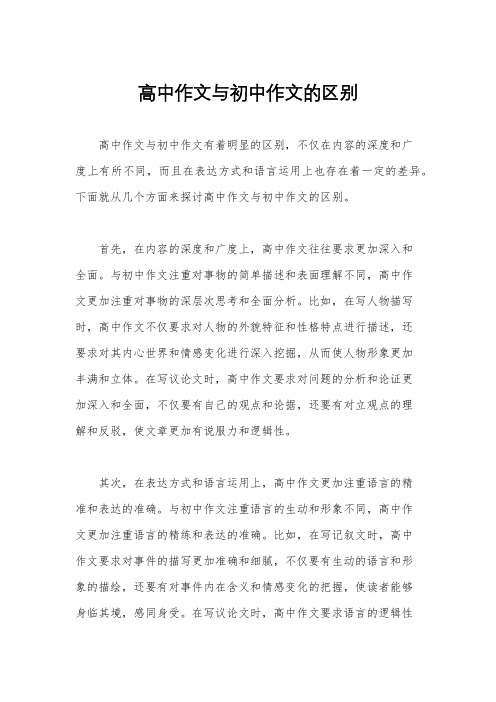
高中作文与初中作文的区别
高中作文与初中作文有着明显的区别,不仅在内容的深度和广
度上有所不同,而且在表达方式和语言运用上也存在着一定的差异。
下面就从几个方面来探讨高中作文与初中作文的区别。
首先,在内容的深度和广度上,高中作文往往要求更加深入和
全面。
与初中作文注重对事物的简单描述和表面理解不同,高中作
文更加注重对事物的深层次思考和全面分析。
比如,在写人物描写时,高中作文不仅要求对人物的外貌特征和性格特点进行描述,还
要求对其内心世界和情感变化进行深入挖掘,从而使人物形象更加
丰满和立体。
在写议论文时,高中作文要求对问题的分析和论证更
加深入和全面,不仅要有自己的观点和论据,还要有对立观点的理
解和反驳,使文章更加有说服力和逻辑性。
其次,在表达方式和语言运用上,高中作文更加注重语言的精
准和表达的准确。
与初中作文注重语言的生动和形象不同,高中作
文更加注重语言的精练和表达的准确。
比如,在写记叙文时,高中
作文要求对事件的描写更加准确和细腻,不仅要有生动的语言和形
象的描绘,还要有对事件内在含义和情感变化的把握,使读者能够
身临其境,感同身受。
在写议论文时,高中作文要求语言的逻辑性
和表达的精准,不仅要有清晰的观点和论据,还要有严密的推理和合理的结构,使文章更加有条理和连贯。
总之,高中作文与初中作文在内容的深度和广度上有所不同,在表达方式和语言运用上也存在着一定的差异。
因此,我们在写作文时要根据不同的要求,灵活运用各种写作技巧,做到恰如其分,使文章更加得体和精彩。
初中高中作文区别
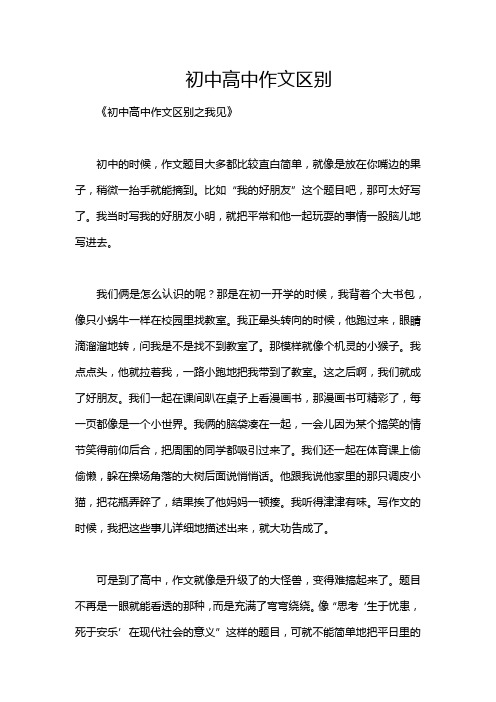
初中高中作文区别《初中高中作文区别之我见》初中的时候,作文题目大多都比较直白简单,就像是放在你嘴边的果子,稍微一抬手就能摘到。
比如“我的好朋友”这个题目吧,那可太好写了。
我当时写我的好朋友小明,就把平常和他一起玩耍的事情一股脑儿地写进去。
我们俩是怎么认识的呢?那是在初一开学的时候,我背着个大书包,像只小蜗牛一样在校园里找教室。
我正晕头转向的时候,他跑过来,眼睛滴溜溜地转,问我是不是找不到教室了。
那模样就像个机灵的小猴子。
我点点头,他就拉着我,一路小跑地把我带到了教室。
这之后啊,我们就成了好朋友。
我们一起在课间趴在桌子上看漫画书,那漫画书可精彩了,每一页都像是一个小世界。
我俩的脑袋凑在一起,一会儿因为某个搞笑的情节笑得前仰后合,把周围的同学都吸引过来了。
我们还一起在体育课上偷偷懒,躲在操场角落的大树后面说悄悄话。
他跟我说他家里的那只调皮小猫,把花瓶弄碎了,结果挨了他妈妈一顿揍。
我听得津津有味。
写作文的时候,我把这些事儿详细地描述出来,就大功告成了。
可是到了高中,作文就像是升级了的大怪兽,变得难搞起来了。
题目不再是一眼就能看透的那种,而是充满了弯弯绕绕。
像“思考‘生于忧患,死于安乐’在现代社会的意义”这样的题目,可就不能简单地把平日里的琐事写进去了。
这时候得动脑子思考一些深刻的东西。
比如我得去查找很多资料,看那些名人是怎样在忧患中崛起,又有哪些人在安乐中沉沦的。
我研究那些企业,大的如诺基亚,曾经是手机行业的巨头,因为满足于自己曾经的辉煌,安乐于现状,没有及时跟上智能手机发展的潮流,结果迅速衰落。
而像华为这样的企业,时刻保持着忧患意识,不断创新,在重重困难下还能发展得越来越好。
不再像初中写作文那样,单纯描述身边小事情就可以,得有深度,要有自己的观点,像从平静的湖底捞出宝贝一样,找出藏在现象背后的本质。
所以说啊,初中作文就像小胡同里的小故事,充满欢乐简单的日常;高中作文那可就是摩天大楼里的大讨论,需要更深层次的思考。
高中生活和初中生活的区别(优秀范文五篇)
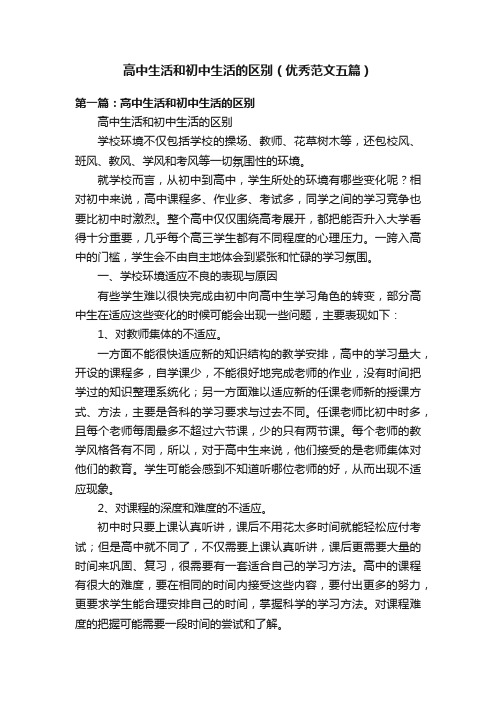
高中生活和初中生活的区别(优秀范文五篇)第一篇:高中生活和初中生活的区别高中生活和初中生活的区别学校环境不仅包括学校的操场、教师、花草树木等,还包校风、班风、教风、学风和考风等一切氛围性的环境。
就学校而言,从初中到高中,学生所处的环境有哪些变化呢?相对初中来说,高中课程多、作业多、考试多,同学之间的学习竞争也要比初中时激烈。
整个高中仅仅围绕高考展开,都把能否升入大学看得十分重要,几乎每个高三学生都有不同程度的心理压力。
一跨入高中的门槛,学生会不由自主地体会到紧张和忙碌的学习氛围。
一、学校环境适应不良的表现与原因有些学生难以很快完成由初中向高中生学习角色的转变,部分高中生在适应这些变化的时候可能会出现一些问题,主要表现如下:1、对教师集体的不适应。
一方面不能很快适应新的知识结构的教学安排,高中的学习量大,开设的课程多,自学课少,不能很好地完成老师的作业,没有时间把学过的知识整理系统化;另一方面难以适应新的任课老师新的授课方式、方法,主要是各科的学习要求与过去不同。
任课老师比初中时多,且每个老师每周最多不超过六节课,少的只有两节课。
每个老师的教学风格各有不同,所以,对于高中生来说,他们接受的是老师集体对他们的教育。
学生可能会感到不知道听哪位老师的好,从而出现不适应现象。
2、对课程的深度和难度的不适应。
初中时只要上课认真听讲,课后不用花太多时间就能轻松应付考试;但是高中就不同了,不仅需要上课认真听讲,课后更需要大量的时间来巩固、复习,很需要有一套适合自己的学习方法。
高中的课程有很大的难度,要在相同的时间内接受这些内容,要付出更多的努力,更要求学生能合理安排自己的时间,掌握科学的学习方法。
对课程难度的把握可能需要一段时间的尝试和了解。
3、对学习方法的不适应虽然初中和高中上课一样都是统一模式,教师讲学生听。
但是,进入高中以后,学生自觉、独立、合理地安排自己的学习更为重要。
要不要记笔记,如何记笔记,记哪些笔记都由学生自己处理。
浅谈初中与高中学习上的差别
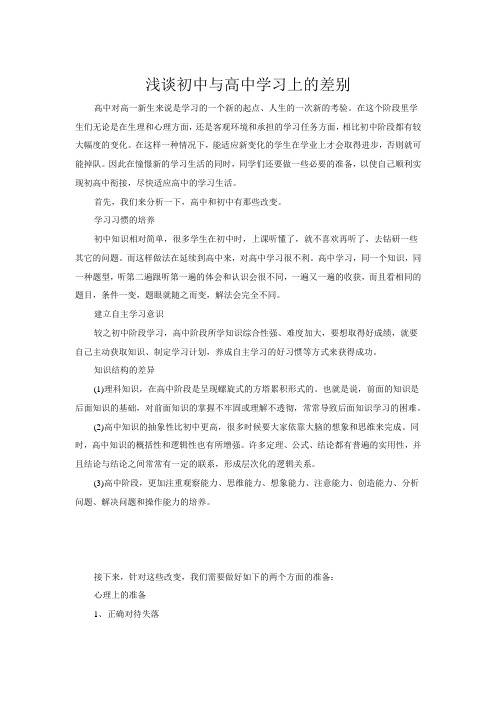
浅谈初中与高中学习上的差别高中对高一新生来说是学习的一个新的起点、人生的一次新的考验。
在这个阶段里学生们无论是在生理和心理方面,还是客观环境和承担的学习任务方面,相比初中阶段都有较大幅度的变化。
在这样一种情况下,能适应新变化的学生在学业上才会取得进步,否则就可能掉队。
因此在憧憬新的学习生活的同时,同学们还要做一些必要的准备,以使自己顺利实现初高中衔接,尽快适应高中的学习生活。
首先,我们来分析一下,高中和初中有那些改变。
学习习惯的培养初中知识相对简单,很多学生在初中时,上课听懂了,就不喜欢再听了,去钻研一些其它的问题。
而这样做法在延续到高中来,对高中学习很不利。
高中学习,同一个知识,同一种题型,听第二遍跟听第一遍的体会和认识会很不同,一遍又一遍的收获,而且看相同的题目,条件一变,题眼就随之而变,解法会完全不同。
建立自主学习意识较之初中阶段学习,高中阶段所学知识综合性强、难度加大,要想取得好成绩,就要自己主动获取知识、制定学习计划,养成自主学习的好习惯等方式来获得成功。
知识结构的差异(1)理科知识,在高中阶段是呈现螺旋式的方塔累积形式的。
也就是说,前面的知识是后面知识的基础,对前面知识的掌握不牢固或理解不透彻,常常导致后面知识学习的困难。
(2)高中知识的抽象性比初中更高,很多时候要大家依靠大脑的想象和思维来完成。
同时,高中知识的概括性和逻辑性也有所增强。
许多定理、公式、结论都有普遍的实用性,并且结论与结论之间常常有一定的联系,形成层次化的逻辑关系。
(3)高中阶段,更加注重观察能力、思维能力、想象能力、注意能力、创造能力、分析问题、解决问题和操作能力的培养。
接下来,针对这些改变,我们需要做好如下的两个方面的准备:心理上的准备1、正确对待失落升入高中尤其是重点高中的学生,一般在初中都是班里的佼佼者,都有其“辉煌”的历史。
进入新集体才发现,新集体里全是“精英”,过去的优势可能不复存在,可能原先还是班级干部变成普通学生,这会使一些学生产生“失落”心理。
高中作文与初中作文的区别
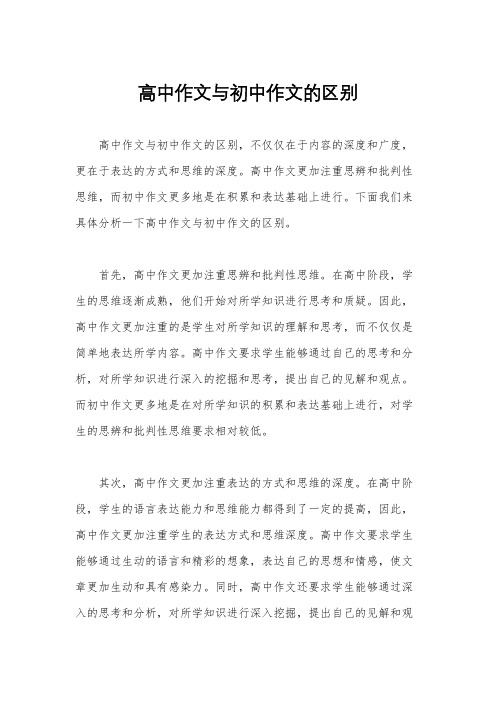
高中作文与初中作文的区别高中作文与初中作文的区别,不仅仅在于内容的深度和广度,更在于表达的方式和思维的深度。
高中作文更加注重思辨和批判性思维,而初中作文更多地是在积累和表达基础上进行。
下面我们来具体分析一下高中作文与初中作文的区别。
首先,高中作文更加注重思辨和批判性思维。
在高中阶段,学生的思维逐渐成熟,他们开始对所学知识进行思考和质疑。
因此,高中作文更加注重的是学生对所学知识的理解和思考,而不仅仅是简单地表达所学内容。
高中作文要求学生能够通过自己的思考和分析,对所学知识进行深入的挖掘和思考,提出自己的见解和观点。
而初中作文更多地是在对所学知识的积累和表达基础上进行,对学生的思辨和批判性思维要求相对较低。
其次,高中作文更加注重表达的方式和思维的深度。
在高中阶段,学生的语言表达能力和思维能力都得到了一定的提高,因此,高中作文更加注重学生的表达方式和思维深度。
高中作文要求学生能够通过生动的语言和精彩的想象,表达自己的思想和情感,使文章更加生动和具有感染力。
同时,高中作文还要求学生能够通过深入的思考和分析,对所学知识进行深入挖掘,提出自己的见解和观点。
而初中作文更多地是在对所学知识的积累和表达基础上进行,对学生的表达方式和思维深度要求相对较低。
最后,高中作文更加注重对学生综合能力的考察。
在高中阶段,学生的综合能力得到了全面的提高,因此,高中作文更加注重对学生综合能力的考察。
高中作文要求学生能够通过自己的思考和分析,对所学知识进行深入的挖掘和思考,提出自己的见解和观点。
同时,高中作文还要求学生能够通过生动的语言和精彩的想象,表达自己的思想和情感,使文章更加生动和具有感染力。
而初中作文更多地是在对所学知识的积累和表达基础上进行,对学生的综合能力要求相对较低。
综上所述,高中作文与初中作文的区别主要体现在思辨和批判性思维、表达的方式和思维的深度以及对学生综合能力的考察上。
高中作文更加注重学生的思辨和批判性思维,要求学生能够通过自己的思考和分析,对所学知识进行深入的挖掘和思考,提出自己的见解和观点。
高中作文与初中作文的区别
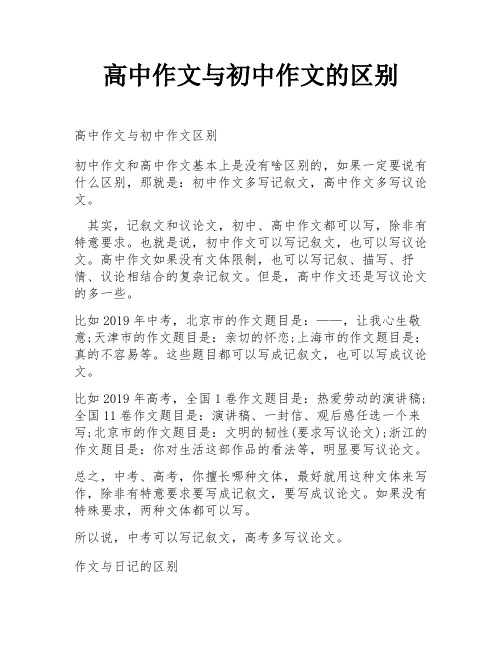
高中作文与初中作文的区别高中作文与初中作文区别初中作文和高中作文基本上是没有啥区别的,如果一定要说有什么区别,那就是:初中作文多写记叙文,高中作文多写议论文。
其实,记叙文和议论文,初中、高中作文都可以写,除非有特意要求。
也就是说,初中作文可以写记叙文,也可以写议论文。
高中作文如果没有文体限制,也可以写记叙、描写、抒情、议论相结合的复杂记叙文。
但是,高中作文还是写议论文的多一些。
比如2019年中考,北京市的作文题目是:——,让我心生敬意;天津市的作文题目是:亲切的怀恋;上海市的作文题目是:真的不容易等。
这些题目都可以写成记叙文,也可以写成议论文。
比如2019年高考,全国1卷作文题目是:热爱劳动的演讲稿;全国11卷作文题目是:演讲稿、一封信、观后感任选一个来写;北京市的作文题目是:文明的韧性(要求写议论文);浙江的作文题目是:你对生活这部作品的看法等,明显要写议论文。
总之,中考、高考,你擅长哪种文体,最好就用这种文体来写作,除非有特意要求要写成记叙文,要写成议论文。
如果没有特殊要求,两种文体都可以写。
所以说,中考可以写记叙文,高考多写议论文。
作文与日记的区别在喜欢音乐的人眼中,处处都飘荡着音符,每一片叶子、每一颗星星,都是一曲美妙的乐曲。
在喜欢绘画的人眼中,处处都渲染着色彩,即使再枯燥的沙漠、再贫瘠的荒野,照样可以画出美丽的画来。
为什么?因为他们有灵感吗?因为他们背着五线谱或者画夹,到处有意去唱、去画吗?并不全是我告诉肖铁,他们可以去唱去画进行基本功的训练,但更多的时候并不是像挤牙膏一样有意勉强为之。
而是他们把音乐和绘画融入进他们的生命和全部生活之中。
于是,他们成为了音乐家和画家。
你应该向他们学习,什么时候不是为写作文而写作文,不是仅仅为了应付老师和家长,而是确实从心底涌出来不写不快,那么,你的作文就进入一个新天地。
这就如同你走进了一片丰收的苹果园,随手摘下哪一个果子都是红的、甜的。
要达到这样的地步,除平常有意锻炼外,坚持记日记就是一种督促自己、培养自己最好的方法。
初中记叙文和高中记叙文的区别
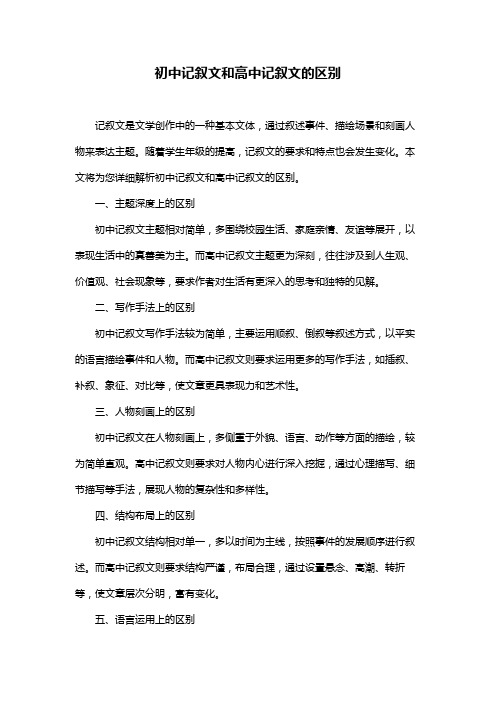
初中记叙文和高中记叙文的区别记叙文是文学创作中的一种基本文体,通过叙述事件、描绘场景和刻画人物来表达主题。
随着学生年级的提高,记叙文的要求和特点也会发生变化。
本文将为您详细解析初中记叙文和高中记叙文的区别。
一、主题深度上的区别初中记叙文主题相对简单,多围绕校园生活、家庭亲情、友谊等展开,以表现生活中的真善美为主。
而高中记叙文主题更为深刻,往往涉及到人生观、价值观、社会现象等,要求作者对生活有更深入的思考和独特的见解。
二、写作手法上的区别初中记叙文写作手法较为简单,主要运用顺叙、倒叙等叙述方式,以平实的语言描绘事件和人物。
而高中记叙文则要求运用更多的写作手法,如插叙、补叙、象征、对比等,使文章更具表现力和艺术性。
三、人物刻画上的区别初中记叙文在人物刻画上,多侧重于外貌、语言、动作等方面的描绘,较为简单直观。
高中记叙文则要求对人物内心进行深入挖掘,通过心理描写、细节描写等手法,展现人物的复杂性和多样性。
四、结构布局上的区别初中记叙文结构相对单一,多以时间为主线,按照事件的发展顺序进行叙述。
而高中记叙文则要求结构严谨,布局合理,通过设置悬念、高潮、转折等,使文章层次分明,富有变化。
五、语言运用上的区别初中记叙文语言较为口语化,简洁明了,符合初中生的语言表达能力。
高中记叙文则要求语言优美、生动、有内涵,能够准确表达作者的情感和观点。
六、创新程度上的区别初中记叙文在创新程度上要求不高,鼓励学生模仿范文进行创作。
而高中记叙文则要求具有一定的创新性,鼓励学生发挥个性,展现独特的视角和思考。
总结:初中记叙文和高中记叙文在主题深度、写作手法、人物刻画、结构布局、语言运用和创新程度等方面存在明显区别。
随着学生年级的提高,记叙文的要求逐渐提高,对学生的观察力、思考力和表达能力提出了更高的挑战。
高中作文和初中作文的不同到底是什么?
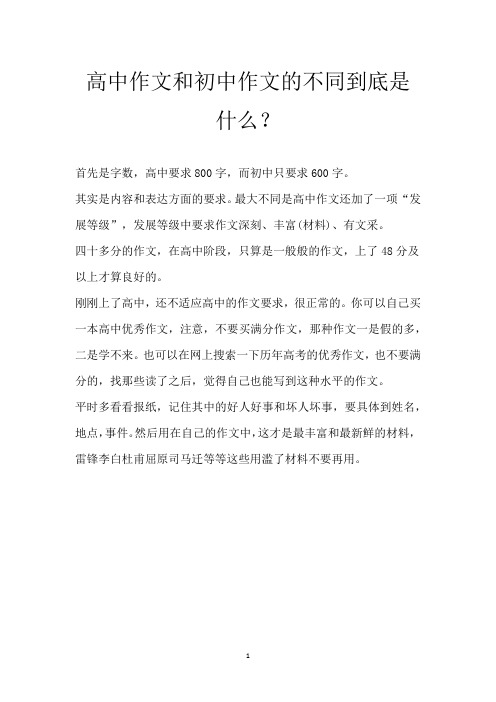
高中作文和初中作文的不同到底是
什么?
首先是字数,高中要求800字,而初中只要求600字。
其实是内容和表达方面的要求。
最大不同是高中作文还加了一项“发展等级”,发展等级中要求作文深刻、丰富(材料)、有文采。
四十多分的作文,在高中阶段,只算是一般般的作文,上了48分及以上才算良好的。
刚刚上了高中,还不适应高中的作文要求,很正常的。
你可以自己买一本高中优秀作文,注意,不要买满分作文,那种作文一是假的多,二是学不来。
也可以在网上搜索一下历年高考的优秀作文,也不要满分的,找那些读了之后,觉得自己也能写到这种水平的作文。
平时多看看报纸,记住其中的好人好事和坏人坏事,要具体到姓名,地点,事件。
然后用在自己的作文中,这才是最丰富和最新鲜的材料,雷锋李白杜甫屈原司马迁等等这些用滥了材料不要再用。
1。
高中语文和初中语文到底有什么区别
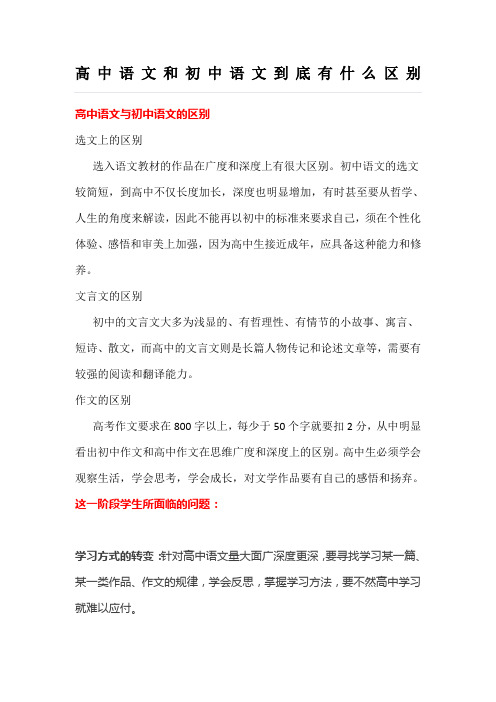
高中语文和初中语文到底有什么区别高中语文与初中语文的区别选文上的区别选入语文教材的作品在广度和深度上有很大区别。
初中语文的选文较简短,到高中不仅长度加长,深度也明显增加,有时甚至要从哲学、人生的角度来解读,因此不能再以初中的标准来要求自己,须在个性化体验、感悟和审美上加强,因为高中生接近成年,应具备这种能力和修养。
文言文的区别初中的文言文大多为浅显的、有哲理性、有情节的小故事、寓言、短诗、散文,而高中的文言文则是长篇人物传记和论述文章等,需要有较强的阅读和翻译能力。
作文的区别高考作文要求在800字以上,每少于50个字就要扣2分,从中明显看出初中作文和高中作文在思维广度和深度上的区别。
高中生必须学会观察生活,学会思考,学会成长,对文学作品要有自己的感悟和扬弃。
这一阶段学生所面临的问题:学习方式的转变:针对高中语文量大面广深度更深,要寻找学习某一篇、某一类作品、作文的规律,学会反思,掌握学习方法,要不然高中学习就难以应付。
暑假里如何去衔接?1、扩大课外阅读直接将教材拿过来是不可取的,而要从大方向上接近,有计划地读一些高中教学大纲规定的参考书目上的课外阅读,如四大名著等长篇大部头作品要在暑假里读。
2、注意生活积累。
生活中处处有语文,当你说话、作文、看报、看书和与人交往时,都是学语文的机会,因此要对周边生活仔细观察,对国家及世界大事也要及时了解。
养成记日记的习惯,对作文技法和内容的积累很有好处。
3、做好身心调试。
进入新的学习阶段和学习环境,要使自己从身体和心理上尽快适应学习节奏和学习要求,调试必不可少。
进入高中了,语文的学习至关重要。
其实,学好语文有两个不可或缺的关键点:一是扩大知识面;二是发展思维加工能力。
前者着眼于积累,后者着眼于训练。
语文水平不高,其中一个很重要的原因是阅读太少。
把多读多写提到重要位置,要求通过朗读、诵读、背诵等丰富多彩的语文实践活动,培养良好的语感,丰富语言的材料,增加文化的底蕴。
初中英语作文与高中英语作文的区别
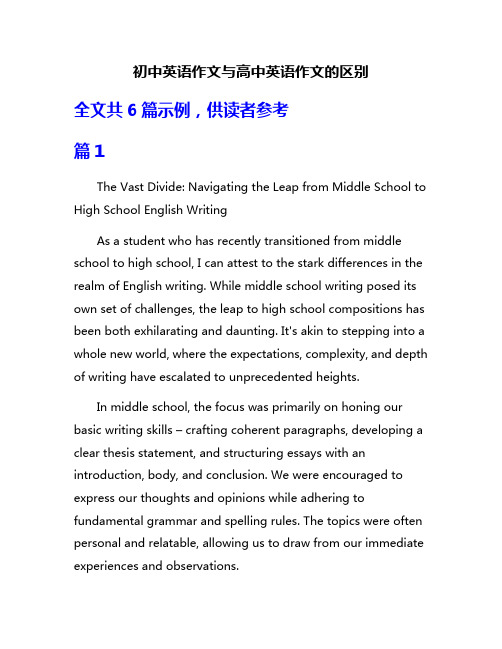
初中英语作文与高中英语作文的区别全文共6篇示例,供读者参考篇1The Vast Divide: Navigating the Leap from Middle School to High School English WritingAs a student who has recently transitioned from middle school to high school, I can attest to the stark differences in the realm of English writing. While middle school writing posed its own set of challenges, the leap to high school compositions has been both exhilarating and daunting. It's akin to stepping into a whole new world, where the expectations, complexity, and depth of writing have escalated to unprecedented heights.In middle school, the focus was primarily on honing our basic writing skills – crafting coherent paragraphs, developing a clear thesis statement, and structuring essays with an introduction, body, and conclusion. We were encouraged to express our thoughts and opinions while adhering to fundamental grammar and spelling rules. The topics were often personal and relatable, allowing us to draw from our immediate experiences and observations.However, upon entering high school, the game changed entirely. Suddenly, we were expected to elevate our writing to a more sophisticated level, one that demanded critical thinking, in-depth analysis, and a nuanced command of language. The subjects we tackled became more abstract and complex, ranging from literary analysis to persuasive essays on socio-political issues.One of the most striking differences lies in the depth of research required for high school writing assignments. In middle school, we could often rely on our general knowledge and personal experiences to craft our essays. But in high school, we are expected to delve into scholarly sources, synthesize various perspectives, and construct well-reasoned arguments backed by credible evidence. The art of effectively citing sources and avoiding plagiarism has become a crucial aspect of our writing journey.Moreover, the level of detail and specificity expected in high school writing is vastly different from middle school. We are no longer just scratching the surface; instead, we must dive deep into the intricacies of our subjects, exploring nuances and complexities that were previously uncharted territory. The abilityto articulate our thoughts with precision and clarity has become paramount, as vague generalizations are no longer acceptable.Additionally, the emphasis on stylistic elements has intensified in high school writing. While middle school compositions focused primarily on conveying ideas coherently, high school writing demands a mastery of rhetorical devices, varied sentence structures, and a rich vocabulary. We are encouraged to experiment with different writing styles and techniques, allowing our voices to shine through while adhering to the conventions of academic writing.Perhaps one of the most challenging aspects of high school writing is the heightened expectation for critical thinking and analysis. We are no longer merely regurgitating information; instead, we must dissect ideas, evaluate multiple perspectives, and formulate our own well-reasoned arguments. The ability to think abstractly and draw insightful connections has become a cornerstone of our writing endeavors.Reflecting on my journey thus far, I can confidently say that the transition from middle school to high school English writing has been a transformative experience. While the initial adjustment was daunting, it has pushed me to grow as a writer, thinker, and communicator. The skills I've acquired – criticalanalysis, research proficiency, and stylistic mastery – will undoubtedly serve me well beyond the confines of the classroom.As I continue to navigate the world of high school writing, I am reminded that this is not merely a academic exercise; it is a journey of self-discovery, intellectual growth, and the cultivation of a voice that will resonate long after I've left these halls. The challenges may be formidable, but the rewards are invaluable –the ability to articulate complex ideas, persuade with eloquence, and leave an indelible mark on the world through the power of the written word.篇2The Leap from Middle School to High School English WritingAs I made the transition from middle school to high school, one aspect that required significant adjustment was the approach to English writing assignments. While English compositions were a regular part of my academic life throughout middle school, the expectations and standards seemed to undergo a notable shift once I entered the realm of high school education.In middle school, English writing assignments often felt like a more straightforward affair. The prompts we received tended to be relatively simple and direct, such as "Write about your favorite holiday" or "Describe a memorable experience from your childhood." The focus was primarily on expressing our thoughts coherently and adhering to basic grammar and spelling rules.Moreover, the length requirements for these assignments were typically modest, rarely exceeding a single page. As long as we managed to convey our ideas within the specified word count, while demonstrating a basic grasp of sentence structure and organization, we could generally expect a decent grade.However, upon entering high school, I quickly realized that the bar had been raised significantly when it came to English writing assignments. The prompts became more complex and open-ended, challenging us to think critically and analyze various perspectives on a given topic.For instance, we might be asked to "Discuss the impact of social media on interpersonal communication" or "Examine the role of technology in reshaping modern education." These prompts required us to go beyond merely recounting personal experiences or expressing preferences; instead, we needed toconduct research, evaluate different viewpoints, and construct well-reasoned arguments supported by evidence.Additionally, the length requirements for high school English compositions were considerably more demanding. What was once a one-page essay in middle school could now be expected to span multiple pages, with word counts often reaching 1,500 or even 2,000 words.This shift in length expectations forced me to develop a more sophisticated approach to structuring my writing. No longer could I simply jot down a few paragraphs and call it a day;I had to carefully plan and organize my thoughts, crafting a clear introduction, supporting body paragraphs, and a compelling conclusion.Furthermore, the emphasis on proper citation and referencing became paramount in high school English writing. While we may have been briefly introduced to these concepts in middle school, they now took on a much more significant role. Failure to properly attribute sources or adhere to specific citation styles could result in substantial deductions or even accusations of plagiarism.Beyond the technical aspects of writing, high school English assignments also demanded a greater level of critical thinkingand analysis. We were expected to delve deeper into the nuances of literary works, dissecting themes, symbolism, and the author's choices in terms of language and narrative structure.Analytical essays that required us to evaluate and interpret texts became a common occurrence, challenging us to move beyond surface-level comprehension and develop a more nuanced understanding of the material.Furthermore, the feedback we received on our writing in high school became more detailed and constructive. Teachers would provide in-depth comments and suggestions, highlighting areas for improvement in terms of argumentation, clarity, and overall coherence.This level of feedback, while initially daunting, proved invaluable in refining my writing skills and preparing me for the rigors of college-level writing assignments.Looking back, the transition from middle school to high school English writing was a significant leap, but one that ultimately fostered growth and development in my ability to express myself effectively through the written word.The increased complexity of prompts, heightened expectations for research and analysis, and emphasis on propercitation and referencing all contributed to a more rigorous and intellectually demanding writing experience.While the adjustment was challenging at times, it ultimately equipped me with invaluable skills that have served me well beyond the confines of the classroom. The ability to articulate well-reasoned arguments, analyze complex issues from multiple perspectives, and communicate ideas with clarity and precision are invaluable assets in various professional and academic settings.As I continue to navigate the realm of higher education and eventually the professional world, I am grateful for the foundation laid by those demanding high school English writing assignments. They taught me the value of perseverance, critical thinking, and the power of the written word to shape ideas and influence perspectives.篇3The Transition from Middle School to High School English WritingAs a student who has recently transitioned from middle school to high school, one of the most significant changes I've noticed is the difference in the expectations for English writingassignments. While the basic principles of good writing remain the same, such as having a clear thesis, well-organized paragraphs, and proper grammar and spelling, the level of depth and complexity required in high school English writing is considerably higher than what was expected in middle school.In middle篇4The Journey from Middle School to High School English CompositionsAs a student who has traversed the academic path from middle school to high school, I can attest to the significant shift in the realm of English compositions. While both stages demand proficiency in the written word, the expectations and requirements evolve considerably, reflecting the progressive nature of education.In middle school, English compositions were akin to a warm-up exercise, a gentle introduction to the art of expressing oneself through written language. The prompts were often straightforward, centered around personal experiences, descriptive narratives, or imaginative tales. The primary focus was on cultivating basic writing skills, such as proper sentencestructure, paragraph organization, and the fundamental rules of grammar and punctuation.Remember those early assignments where we were asked to recount a memorable summer vacation or describe our favorite book character? These tasks were designed to spark our creativity and encourage us to explore the power of words in conveying emotions, sensory details, and personal perspectives. The grading criteria were relatively lenient, with emphasis placed on effort, creativity, and adherence to the fundamental writing conventions.However, as we embarked on the high school journey, the landscape of English compositions underwent a profound transformation. Suddenly, the stakes were raised, and the expectations soared. No longer were we confined to the realms of personal narratives; instead, we were thrust into the world of analytical and argumentative writing.High school English compositions demanded a higher level of critical thinking and a deeper understanding of rhetorical techniques. We were expected to dissect literary works, analyze complex themes, and construct well-structured arguments supported by textual evidence. The prompts became morenuanced, challenging us to explore societal issues, historical events, or philosophical concepts.I vividly recall the daunting task of crafting a persuasive essay on a controversial topic, meticulously researching credible sources, and skillfully weaving evidence into a coherent and compelling argument. The emphasis shifted from personal expression to academic rigor, requiring us to hone our analytical skills and develop a command of formal writing conventions.Moreover, the evaluation criteria in high school English compositions became more stringent. Instructors scrutinized our ability to construct logical and coherent arguments, employ sophisticated vocabulary and rhetorical devices, and adhere to the conventions of academic writing. Proper citation formats, such as MLA or APA, became essential, as we learned to navigate the intricate world of referencing and avoiding plagiarism.The feedback we received on our high school compositions was often more detailed and constructive, highlighting areas for improvement in organization, development of ideas, and the effective use of evidence and counterarguments. It was a constant cycle of writing, revising, and refining, as we strived to elevate our skills to meet the rigorous standards of academic discourse.Yet, despite the increased challenges, the rewards of mastering high school English compositions were invaluable. We developed critical thinking abilities that transcended the boundaries of the English classroom, preparing us for the intellectual rigors of higher education and the professional world. The art of persuasive writing, the ability to analyze complex texts, and the skill of articulating well-reasoned arguments became invaluable assets in our academic and personal growth.As I reflect on this journey, I can't help but appreciate the gradual progression and the invaluable lessons learned along the way. Middle school English compositions laid the foundation, nurturing our love for the written word and instilling the basic principles of effective communication. High school compositions, on the other hand, challenged us to elevate our skills, fostering critical thinking, academic rigor, and a deeper appreciation for the power of language in shaping ideas and influencing minds.The transition from middle school to high school English compositions was a transformative experience, one that demanded perseverance, dedication, and a willingness to embrace intellectual growth. It was a journey that equipped us with the essential tools to navigate the complexities of academicdiscourse and ultimately prepared us for the challenges that lie ahead, whether in higher education or the professional realm.篇5Certainly! Here is an essay of approximately 2,000 words on the differences between middle school and high school English compositions, written from a student's perspective in English:The Contrast Between Middle School and High School English EssaysAs a student who has recently transitioned from middle school to high school, I have noticed a significant shift in the expectations and requirements for English essays. While both levels emphasize the importance of effective written communication, the approach and depth of analysis required in high school compositions are markedly different from those in middle school. In this essay, I will explore the key distinctions between middle school and high school English essays, drawing from my personal experiences and observations.In middle school, the primary focus of English essays was often on developing basic writing skills, such as proper grammar, sentence structure, and paragraph organization. Teachers would typically provide clear guidelines and prompts, guiding studentsthrough the writing process step by step. The topics for these essays were generally straightforward and relatable to the students' everyday lives, such as describing a favorite book, sharing a memorable experience, or expressing an opinion on a current event.The structure of middle school English essays was relatively simple, typically following the traditional five-paragraph format: an introduction, three body paragraphs, and a conclusion. The emphasis was on presenting a clear thesis statement, supporting it with relevant examples or details, and wrapping up with a concise summary. While some analysis was expected, the depth was limited, and the primary objective was to demonstrate a basic understanding of the topic and the ability to express ideas coherently.In contrast, high school English essays demand a much higher level of critical thinking, analysis, and sophistication. The topics tend to be more complex, delving into literary works, historical events, or abstract concepts that require in-depth exploration and interpretation. Instead of relying solely on personal experiences or opinions, students are expected to incorporate external sources, such as scholarly articles, literarycriticism, or primary source documents, to support their arguments and provide context.The structure of high school English essays is more flexible and often deviates from the traditional five-paragraph format. Students are encouraged to experiment with different organizational techniques, such as comparing and contrasting, cause and effect, or chronological order, depending on the specific requirements of the assignment. The introduction and conclusion sections are expected to be more nuanced, with a clear thesis statement that sets the tone for the essay and a compelling conclusion that synthesizes the key points and offers insightful final thoughts.Additionally, high school English essays place a greater emphasis on developing a distinct writing style and voice. Students are expected to demonstrate a command of sophisticated vocabulary, varied sentence structures, and appropriate tone and register for the intended audience. The use of literary devices, such as metaphors, analogies, and rhetorical questions, is encouraged to enhance the essay's overall impact and persuasiveness.Furthermore, high school English essays often require a deeper level of analysis and interpretation. Students areexpected to go beyond merely summarizing or restating information and instead critically evaluate the subject matter from multiple perspectives. This may involve examining the underlying themes, symbolism, or historical context of a literary work, or exploring the implications and consequences of a particular event or idea.In terms of research and citation, high school English essays demand a more rigorous approach. Students must effectively incorporate and synthesize information from various credible sources, while adhering to proper citation formats, such as MLA or APA style. Plagiarism is taken seriously, and students are expected to demonstrate academic integrity by properly attributing any borrowed ideas or direct quotes.Moreover, the revision and editing process for high school English essays is more extensive and iterative. Students are often required to submit multiple drafts, receiving feedback from peers and instructors at each stage. This process encourages them to refine their ideas, strengthen their arguments, and improve their writing skills through continuous reflection and refinement.Despite the increased complexity and rigor of high school English essays, the overarching goal remains the same: todevelop effective written communication skills that will serve students well in their future academic and professional endeavors. The transition from middle school to high school writing expectations can be challenging, but it also presents an opportunity for personal growth and intellectual development.As I navigate this transition, I find myself constantly pushing my boundaries, expanding my knowledge, and refining my analytical and writing abilities. While the demands of high school English essays may seem daunting at first, embracing the challenge and recognizing the value of this intellectual exercise is crucial for success.In conclusion, the contrast between middle school and high school English essays is substantial, reflecting the increasing complexity and sophistication expected of students as they progress through their academic journey. Middle school essays focus on developing basic writing skills and conveying personal experiences or opinions, while high school essays demand critical analysis, incorporation of external sources, and a command of more advanced writing techniques. Ultimately, this transition serves as a stepping stone, equipping students with the necessary skills to tackle the rigorous academic writing requirements they will encounter in college and beyond.篇6The Differences Between Middle School and High School English EssaysAs a student who has progressed from middle school to high school, I have noticed significant differences in the expectations and requirements for English essays at these two different educational levels. While middle school essays aimed to establish a solid foundation in writing skills, high school essays demand a more advanced and sophisticated approach. In this essay, I will explore the key distinctions between middle school and high school English essays, highlighting the evolving challenges and complexities that students encounter along their academic journey.Structure and Organization:In middle school, the structure of English essays was generally more straightforward and followed a basicfive-paragraph format: an introduction, three body paragraphs, and a conclusion. The emphasis was on ensuring clarity, coherence, and logical flow of ideas. However, in high school, the structure becomes more flexible and intricate. Essays are expected to have a more complex and nuanced organization,with multiple body paragraphs that delve deeper into the topic and explore various facets of the argument or analysis.Thesis Statements:Middle school English essays often featured relatively simple and straightforward thesis statements that clearly stated the main idea or position of the essay. In contrast, high school thesis statements tend to be more sophisticated and multifaceted, encapsulating the essay's central argument while also hinting at the complexity of the topic and the various perspectives or counterarguments that may be addressed.Evidence and Support:In middle school, the primary focus was on using relevant examples and evidence from the assigned texts or materials to support the main points of the essay. However, in high school, students are expected to draw upon a broader range of sources, including scholarly articles, literary critiques, and historical documents. The ability to critically evaluate and synthesize multiple sources becomes crucial in building a persuasive and well-substantiated argument.Analytical Depth:Middle school English essays typically emphasized comprehension and a basic level of analysis, where students were expected to demonstrate an understanding of the assigned material and provide a straightforward interpretation or response. In high school, however, the level of analysis is significantly elevated. Students are required to engage in deeper critical thinking, exploring complex themes, analyzing literary devices, and examining various perspectives and contextual factors that shape the meaning and significance of a text or topic.Writing Style and Voice:In middle school, the writing style was generally more informal and conversational, with a focus on clear expression and basic language skills. High school English essays, on the other hand, demand a more formal and academic tone, with careful attention paid to word choice, sentence structure, and the use of rhetorical devices. Additionally, students are expected to develop a distinct voice and style that reflects their individual perspectives and analytical abilities.Research and Citation:While research and citation were introduced in middle school, the expectations were relatively modest, often limited tociting sources within the assigned materials. In high school, however, research skills become paramount. Students are required to conduct extensive research, navigate academic databases, and properly cite a variety of sources using established citation styles, such as MLA or APA format. Proper attribution and avoiding plagiarism are emphasized as essential components of academic integrity.Feedback and Revision:Both middle school and high school English essays involve the process of feedback and revision, but the depth and focus of this process differ. In middle school, feedback often concentrated on basic writing mechanics, such as grammar, spelling, and sentence structure. In high school, however, the feedback becomes more substantive, addressing issues of argumentation, logic, and critical analysis. Students are expected to engage in multiple rounds of revision, refining their ideas, strengthening their arguments, and polishing their writing to meet the higher standards of academic discourse.Overall, the transition from middle school to high school English essays represents a significant leap in terms of intellectual rigor, critical thinking, and writing proficiency. While middle school essays lay the groundwork for essential writingskills, high school essays demand a more sophisticated level of analysis, research, and argumentation. This progression is crucial in preparing students for the academic challenges ofcollege-level writing and fostering the ability to engage in substantive discourse on complex topics. As students navigate this transition, they develop invaluable skills in critical thinking, effective communication, and intellectual maturity that will serve them well in their future academic and professional pursuits.。
高中与初中的区别_高一日记
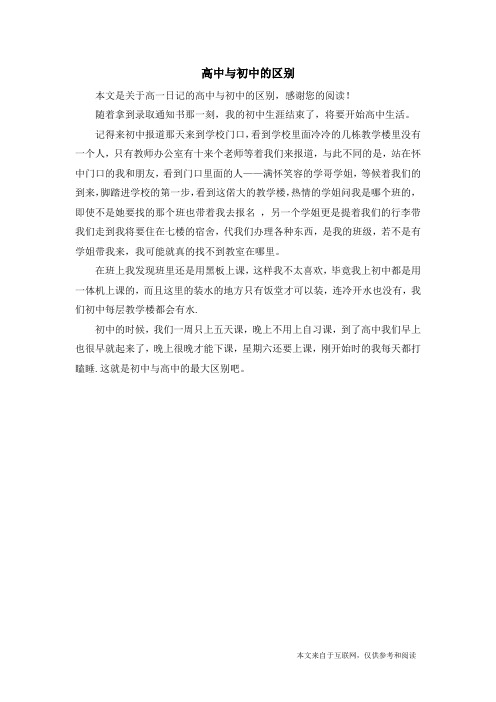
高中与初中的区别
本文是关于高一日记的高中与初中的区别,感谢您的阅读!
随着拿到录取通知书那一刻,我的初中生涯结束了,将要开始高中生活。
记得来初中报道那天来到学校门口,看到学校里面冷冷的几栋教学楼里没有一个人,只有教师办公室有十来个老师等着我们来报道,与此不同的是,站在怀中门口的我和朋友,看到门口里面的人——满怀笑容的学哥学姐,等候着我们的到来,脚踏进学校的第一步,看到这偌大的教学楼,热情的学姐问我是哪个班的,即使不是她要找的那个班也带着我去报名,另一个学姐更是提着我们的行李带我们走到我将要住在七楼的宿舍,代我们办理各种东西,是我的班级,若不是有学姐带我来,我可能就真的找不到教室在哪里。
在班上我发现班里还是用黑板上课,这样我不太喜欢,毕竟我上初中都是用一体机上课的,而且这里的装水的地方只有饭堂才可以装,连冷开水也没有,我们初中每层教学楼都会有水.
初中的时候,我们一周只上五天课,晚上不用上自习课,到了高中我们早上也很早就起来了,晚上很晚才能下课,星期六还要上课,刚开始时的我每天都打瞌睡.这就是初中与高中的最大区别吧。
本文来自于互联网,仅供参考和阅读。
- 1、下载文档前请自行甄别文档内容的完整性,平台不提供额外的编辑、内容补充、找答案等附加服务。
- 2、"仅部分预览"的文档,不可在线预览部分如存在完整性等问题,可反馈申请退款(可完整预览的文档不适用该条件!)。
- 3、如文档侵犯您的权益,请联系客服反馈,我们会尽快为您处理(人工客服工作时间:9:00-18:30)。
一、首先谈谈初中作文与高中作文的区别,初中作文是我们练习写作的开始,以记叙文为主,叙述一件或几件事,表达一定的情感,看重的是真实情感的流露以及语言表达能力,思想性要求偏低,所以回看初中的作文,我们会发现很多题材比较低幼,说理并不深入,只是在运用各种语言技巧表达自己的情感。
随着我们认知水平的提高,高中作文的要求也相应有很大提高。
首先文体上看,不再以记叙文为主,议论性的文体占据上风,这就对文章的思想性提出了很高的要求,要求我们有很强的思考思辨能力,能对事物进行比较深入的思考,提出自己独特的见解,不再是停留在表面。
但是这并不意味着语言技巧不再重要,优秀的文章往往是将强有力、深刻的思想与出色的语言表达结合起来,避免华而不实,避免枯燥乏味。
高中作文的语言表达要求更高,往往需要让人耳目一新,心灵有所震撼。
而对于记叙文,并不是一下子摒弃,很多时候,一篇优秀的记叙文会更吸引人,在记叙文方面,要加强自己选材的判断力,避免叙事老套低幼,从独特的视角叙述,重要的是配以精妙的议论,以起到画龙点睛的作用。
总而言之,高中作文在内容、思想、语言等各个方面都提出了比初中作文更高的要求。
二、以下是对高中作文写作(以及如何合理有效的从初中作文模式过渡到高中作文模式)的一点拙见:
(1)阅读。
大家从现在开始要有针对性的阅读一些富有思想性的文章,比如年度随笔选之类的,与深刻的思想发生有效碰撞会使我们的思想不知不觉提高层次,在一个更高的轨道上运行,从而写出更
有深度的文章。
(2)观察生活,深入思考。
一切写作都是生活的子集,只有源于真实生活的文字才有感染力,引起读者的共鸣。
所以大家要用心留意生活,生活中绝佳的写作素材无处不在,从日常生活的琐屑中经过思考发掘出某些深刻有力的东西往往是作文中的亮点,作文中的一个细致入微的生活小画面,一点精辟的生活小哲理,都能为文章增色不少。
这就是小生活的巨大力量。
(3)不断借鉴。
走过高三,发现最宝贵的是印发的优秀作文,从中可以发掘很多宝贵的写作灵感。
多与同学们交流写作感受,必要的时候可以进行模仿,假以时日,大家会发现自己的写作技能有了很大提高。
(4)提升自己写作的广度。
这是比较难的一点,因为每个人都有自己擅长以及偏爱的风格,有的同学可能擅长语言表达,有的可能更擅长说理,这会导致一个人写作风格的固定。
这不是什么不好的事,但据经验判断,擅长多样化写作的同学更能胜任高考作文的稳定发挥。
所以在写作上要敢于尝试各种风格,争取在各种风格的文章上都有所长进,避免陷入写作的僵局。
总之,从初中作文过渡到高中作文其实还是一个比较自然的过程。
它是伴随着我们心灵成熟而发展的,用心提升自己的阅读能力、观察能力、思辨能力、表达能力,相信会在写作上获得很大成功。
